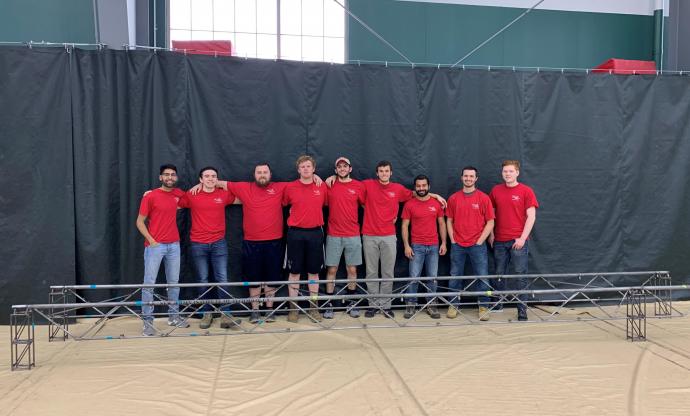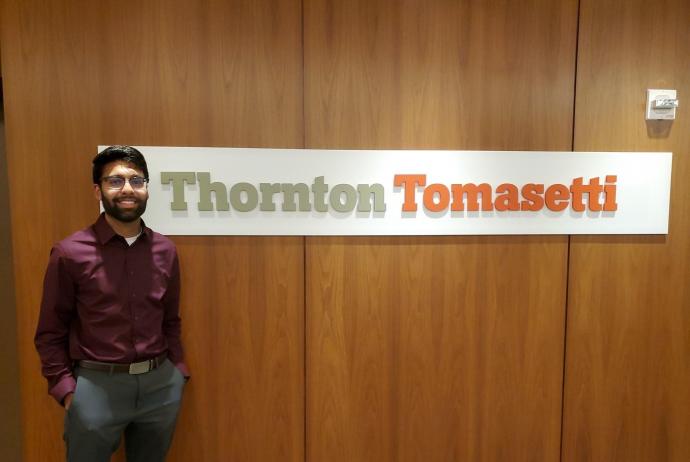Senior Success: The Skyline Soars on Engineer Niyam Shah's Horizon

For his senior capstone project, Niyam Shah went big: The civil engineering major and his teammates designed a 40-story commercial tower with a thick concrete core and X-patterned steel bracing for an empty lot on Manhattan’s building-jammed West Side.
“The core supports the building, but the higher up you go, the more the building tilts, so we added steel to brace against wind forces,” said Shah, who is this year’s “Outstanding Senior” for the Department of Civil and Environmental Engineering (CEE) and a keen designer. The team chose a commercial building, with its 15-ft.-high ceilings, as an added challenge.
“I spent eight-hour days on the computer analyzing core shapes, concrete strengths and corresponding steel bracing patterns so that we would meet New York City’s building code requirements, while also making the building economically feasible in terms of construction and material costs,” he recounted. “We wanted to mirror the experience of talking to a client, and avoid spending millions of dollars on something they wouldn’t need.”
Shah, who hopes to make a career of building “very tall” steel buildings, heads this fall to the University of Texas at Austin to pursue a master’s degree in structural engineering.
“I'll be studying a wide range of topics related to building structures and how they react under certain scenarios,” he said. “More generally, I’ll take what I learned as an undergraduate at NJIT and add complexity. Buildings in the real world take years to design and construct and there are so many nuances.”
“Buildings – tall buildings even more so – sway in the wind, even though you may not feel it, which is pretty cool. You design for that and it’s a complex process. How you optimize steel, by interconnecting it within the system in the best and least expensive way, takes creativity,” he explains. “You also take into account the building’s construction and so knowing construction methods is also important in this field. There’s no point in designing something that can’t be readily built.”
What first drew him to this sturdy and versatile metal was the chance to join NJIT’s American Institute of Steel Construction steel bridge team (above), which competes with colleges across the country to fabricate, assemble and stress test scale-model bridges.
“It was my first chance to create something from nothing, utilizing the whole engineering process, and improve the structure through trial and error,” he recalls. He was recently the co-captain for the design team, learning from year to year, for example, how to better coordinate design with the construction captains. “The more complicated it is, the more mistakes people make.”
As an intern in the forensics department with global engineering firm Thornton Tomasetti, where he has reviewed remediation plans for buildings that have sustained damaged and visited sites to inspect the restoration work in progress, Shah has studied what can go wrong in building design.
“In order to understand how to build a structure, you first have to know how it can collapse,” he notes of his first lesson learned. “You’ve got to understand the risks and plan for uncertainties in the load and natural forces such as hurricane winds, flooding and earthquakes. You also have to think into the future and consider the longevity of your design. You can’t design a parking deck for small cars if people are starting to buy SUVs.”
But Shah’s focus on design is not all-encompassing.
“My best experience in college has been getting to know people,” he notes, adding that in the workplace, he believes people skills will far outweigh technical acumen. “Engineering is also a business. You need to meet people to find jobs, understand that the client comes first and work with other people on projects.”
In nominating him for the Outstanding Senior award, CEE Chairman Taha Marhaba pointed to the “major role” Shah has played in the department as the department’s former Student Senate representative and as the 2019 vice president of NJIT’s American Society of Civil Engineers student chapter.
“From planning ethics presentations to setting up information sessions with industry professionals, Niyam has taken the lead on making these events happen and is dedicated to helping our students succeed,” Marhaba said. Last year, his work ethic won him the department’s Junior Excellence Award.
Perhaps his greatest accomplishment, however, is the founding of NJIT’s chapter of the professional engineering fraternity, Theta Tau, which bridges all of the engineering disciplines.
“It felt like I was starting a company,” he recalls. “We had to create an organization from scratch: recruit members, find locations to meet and hold events and people to help administer them, secure funding and communicate with other groups to coordinate activities. As in a business, we had to identify all of our stakeholders.”
Founded in February, 2018, Theta Tau won “Outstanding New Student Organization” later that spring. During its first few months, the group co-hosted events with organizations such as NJIT’s Career Development Services, the Albert Dorman Honors College, the Women in Computing Society and Habitat for Humanity. To recruit members, the group held information sessions, game nights, engineering days with hands-on projects, community service outings and talks with potential employers. There are now 65 members.
Their greatest success?
“When you first start as a fraternity, you’re what’s called a colony. You need to show the national organization that you can uphold their principles and take on the role of educating others on what engineering really is,” he says. “We just became a chapter. So with all of our hard work starting in 2018, we’ve proven that we can handle everything we were given, balancing professional work, brotherhood and community service. We’re here for the long run.”

